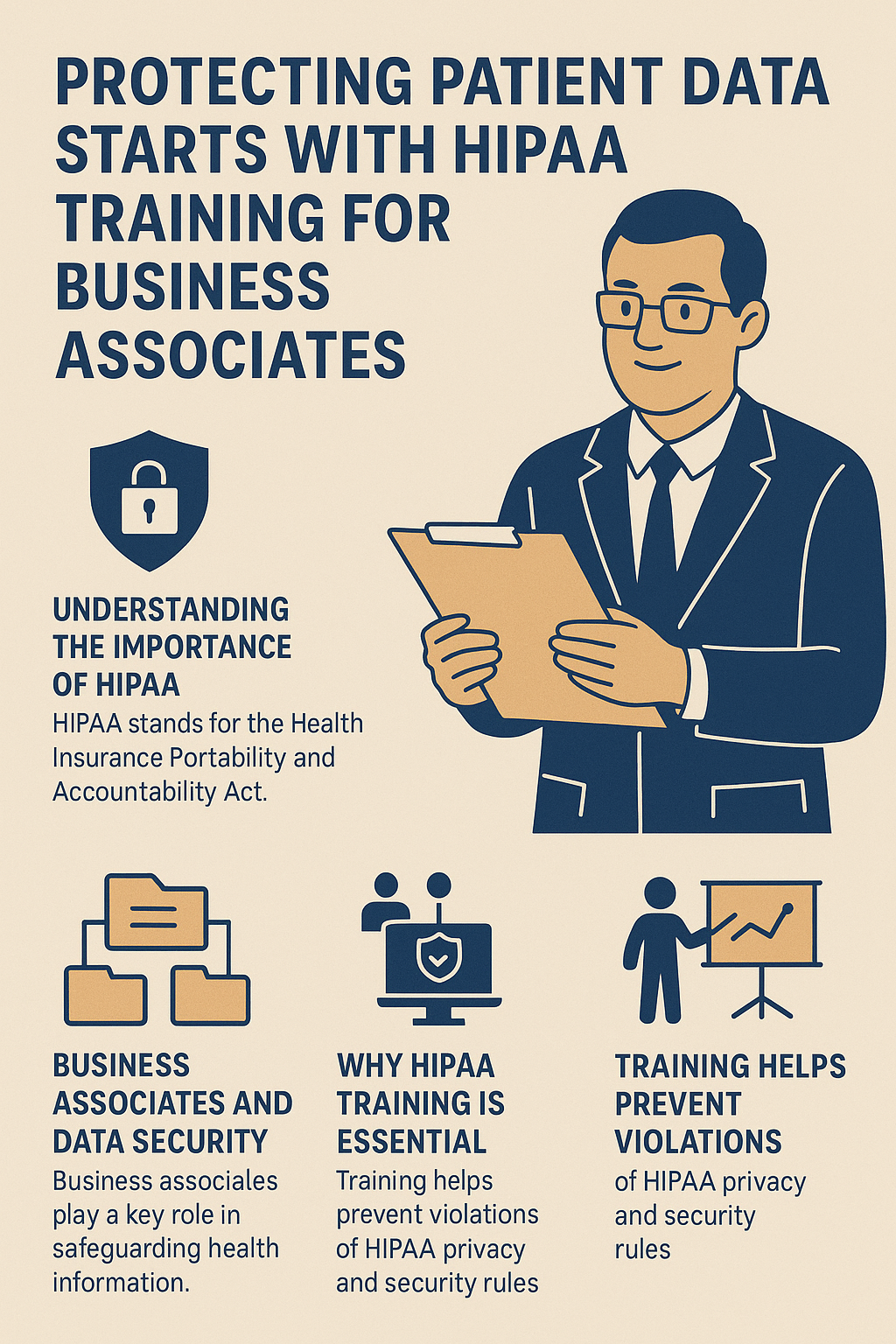Protecting Patient Data Starts with HIPAA Training for Business Associates
Understanding the Importance of HIPAA in Modern Healthcare
The modern healthcare industry depends on secure handling of health information and transparent business relationships between providers and third-party vendors. Every day, millions of health plans, healthcare providers, and their business associates process protected health information (PHI) to deliver quality care. However, without proper HIPAA training, these interactions can expose organizations to costly data breaches, compliance failures, and reputational harm.
HIPAA, which stands for the Health Insurance Portability and Accountability Act, was enacted to protect the privacy and security of patients’ data. Its goal is to ensure health insurance portability, maintain patient trust, and safeguard medical records and personal health information. When business associates understand and apply the HIPAA privacy and security rules, they help covered entities prevent unauthorized access and maintain compliance with federal law.
What HIPAA Stands For and Why It Matters
The Foundation of Health Data Protection
HIPAA stands for the Health Insurance Portability and Accountability Act, a federal law designed to create national standards for protecting health information. It was introduced by the U.S. Department of Health and Human Services (HHS) to strengthen the security of electronic health information, limit improper disclosures, and standardize privacy requirements across all healthcare organizations.
The Health Insurance Portability and Accountability Act ensures that every organization handling certain health information follows the same rules, whether they’re healthcare providers, health plans, or third-party business associates. Compliance with HIPAA regulations is not optional—it’s a legal and ethical obligation that safeguards both patients and professionals.
Business Associates: The Front Line of Data Security
Understanding Their Role in HIPAA Compliance
Business associates are vendors or contractors that handle protected health information (PHI) on behalf of covered entities such as hospitals, nursing homes, and health plans. These entities include billing services, IT providers, law firms, and data management vendors. Because they interact directly with sensitive patient data, their role in maintaining HIPAA compliance is critical.
Every business associate must adhere to the same privacy and security standards as the covered entities they serve. This includes following security rules, conducting regular risk assessments, and maintaining signed business associate agreements. These contracts define how patient data will be protected, stored, and shared, ensuring that all parties remain HIPAA compliant under federal law.
Why HIPAA Training Is Essential for Business Associates
Building Awareness and Accountability
Without regular HIPAA training, employees and contractors may unintentionally violate HIPAA rules, exposing covered entities to serious legal and financial consequences. Effective HIPAA staff training ensures that every team member understands the importance of health information privacy, data handling protocols, and breach notification rules.
Proper training teaches participants how to identify threats, prevent unauthorized access, and recognize the importance of privacy and security procedures. Whether your company provides IT support, legal services, or billing assistance, your team must be trained to comply with both HIPAA privacy and security standards to avoid violations.
HIPAA Compliance: A Shared Responsibility
Covered Entities and Business Associates Working Together
Both covered entities and their business associates share responsibility for protecting health information. When both parties invest in ongoing HIPAA training, they create a culture of awareness that minimizes the risk of data breaches.
This collaboration extends beyond compliance—it demonstrates ethical integrity and commitment to patient privacy. By following HIPAA rules and the privacy rule, organizations show that they value the trust patients place in them when sharing sensitive health information phi.
The Key Components of HIPAA Training
What Every Business Associate Should Know
Comprehensive HIPAA training should include:
- Understanding the Health Insurance Portability and Accountability Act and its primary objectives.
- Recognizing what qualifies as protected health information (PHI) and private health information.
- Learning the security rules, privacy rule, and omnibus rule provisions.
- Responding to incidents through breach response procedures and breach notification rules.
- Performing risk assessments and implementing effective security policies.
- Maintaining compliance with state privacy laws and the HITECH Act.
By using tailored training materials, organizations can ensure their employees grasp the unique HIPAA regulations that apply to their role.

The Connection Between the HITECH Act and HIPAA
Strengthening Data Protection Across Healthcare
The HITECH Act expanded the HIPAA framework by emphasizing electronic health information protection and breach notification procedures. It requires business associates and covered entities to implement stricter security requirements for managing health information digitally.
Together, the Health Insurance Portability and Accountability Act and HITECH Act enhance data security in the healthcare industry, reinforcing accountability for safeguarding protected health information phi across all levels of operation.
Understanding HIPAA Privacy and Security Rules
The Core of Data Protection
The HIPAA privacy and security rules form the backbone of patient data protection. The privacy rule regulates how covered entities and business associates can use and disclose health information, while the security rule sets technical and administrative safeguards for electronic health information.
Together, these rules create a framework that ensures privacy and security across all aspects of healthcare. Whether handling medical records, billing data, or personal health information, compliance with these standards is mandatory.
The Omnibus Rule: Expanding HIPAA Liability
Why It Matters for Business Associates
The Omnibus Rule clarified that business associates and their subcontractors are directly liable for compliance with HIPAA rules. This means every organization handling health information must follow privacy requirements and ensure that any unsecured PHI is protected.
Failure to meet these obligations can result in severe criminal penalties, fines, and legal consequences. Proper HIPAA training and documentation are essential to demonstrating compliance in case of a court order or audit.
Risk Assessments: Identifying Weak Points Before They Cause Harm
Proactive Security for Healthcare Organizations
Conducting regular risk assessments helps business associates identify potential vulnerabilities in their systems. These evaluations assess security standards, security policies, and procedures to prevent data breaches before they occur.
By analyzing how your team stores, transmits, and accesses health information, you can ensure compliance with security rules and privacy and security obligations under federal law.
Breach Notification Rules: What to Do When Security Fails
Acting Fast to Protect Patients and Compliance
Despite strong safeguards, data breaches can still happen. When they do, the breach notification rules under HIPAA and the HITECH Act require covered entities and business associates to notify patients promptly.
Having a detailed breach response plan, supported by well-trained employees, ensures your organization can react quickly, mitigate harm, and maintain public trust. Effective HIPAA training equips your team with the skills to handle such incidents professionally and in compliance with federal regulations.
The Role of Health and Human Services (HHS)
Oversight and Enforcement
The U.S. Department of Health and Human Services enforces HIPAA compliance through its Office for Civil Rights (OCR). The OCR investigates improper disclosures, audits covered entities, and issues penalties for violations of privacy and security laws.
By prioritizing training and compliance, your organization demonstrates good faith and reduces the likelihood of costly audits and enforcement actions.
The Cost of Noncompliance
How Ignorance Becomes Expensive
Ignoring HIPAA compliance exposes both covered entities and business associates to significant fines and potential criminal penalties. The OCR can impose multimillion-dollar penalties for repeated violations or negligence.
Beyond financial losses, a data breach can destroy a company’s reputation. Patients expect their health information privacy to be respected; one failure can permanently damage trust. Regular training and compliance efforts are essential for avoiding such risks.
The Importance of Ongoing HIPAA Training
Keeping Knowledge Current and Compliance Strong
Laws and HIPAA rules evolve constantly, making ongoing HIPAA training essential. Employees must understand updates to the portability and accountability act, security requirements, and privacy rule to remain compliant.
Annual refreshers, updated training materials, and continuous education ensure that your organization keeps pace with the latest regulations. Investing in education is the best defense against unintentional violations and improper disclosures.
The Role of Law Firms and Legal Services in HIPAA Compliance
Expert Guidance for Complex Regulations
Many law firms and legal services specialize in helping healthcare organizations navigate HIPAA compliance. A skilled HIPAA lawyer can assist in drafting business associate agreements, interpreting state privacy laws, and conducting risk assessments.
These professionals offer extensive experience in the healthcare industry and ensure that your organization meets all federal law requirements for safeguarding patient data.
Building a Culture of Compliance and Accountability
Making HIPAA a Core Organizational Value
Compliance shouldn’t be viewed as a burden—it’s a mindset that shapes every aspect of your organization’s operations. Encouraging training, enforcing procedures, and regularly reviewing security standards create a proactive environment of trust and accountability.
When your staff understands how to handle health information phi responsibly, your organization reduces risk and strengthens patient privacy. This commitment ultimately leads to safer care and improved trust between patients and healthcare providers.
How Business Associates Can Protect Patient Information
Practical Steps Toward Compliance
To remain compliant and trustworthy, business associates should:
- Conduct regular HIPAA training sessions for all staff.
- Perform periodic risk assessments to identify vulnerabilities.
- Maintain updated security policies and incident response plans.
- Encrypt protected health information (PHI) during transmission and storage.
- Review and renew business associate agreements annually.
- Document all training and compliance measures to demonstrate accountability.
Implementing these practices reduces exposure to legal risks and ensures alignment with HIPAA privacy and security rules.
Increasing Healthcare Network Security and Notification of Breach
In today’s digital age, health insurance companies, health care providers, and their business associates rely heavily on advanced health information technology to manage sensitive data. This interconnected system improves efficiency but also increases the risk of unauthorized access and data misuse. Robust security and breach notification procedures, supported by thorough HIPAA training, ensure that every organization handling patient information can respond swiftly and responsibly to potential threats.
At Masterly Legal Solutions, we help clients develop comprehensive compliance frameworks that safeguard sensitive information such as patient records, billing data, and phone numbers. By prioritizing staff education, secure technology use, and proactive monitoring, healthcare organizations can prevent costly violations while maintaining patient trust and regulatory compliance.
Strengthen Your HIPAA Compliance Program with Masterly Consulting Group
Protecting sensitive patient data begins with awareness, preparation, and proper education. At Masterly Consulting Group, we specialize in helping business associates, covered entities, and healthcare organizations enhance their compliance through in-depth HIPAA staff training and program development. Our experts have extensive experience in HIPAA compliance, privacy frameworks, and the evolving federal standards that govern patient information protection.
If your organization needs guidance on meeting HIPAA standards, improving data protection protocols, or ensuring your team fully understands compliance responsibilities, our consultants are ready to assist. We help you identify weaknesses, strengthen internal controls, and create long-term strategies that safeguard your patients’ trust and your organization’s reputation.
Call (888) 209-4055 today to schedule a free consultation and discover how Masterly Consulting Group can help your business implement effective HIPAA training and maintain full compliance with privacy and security requirements.








